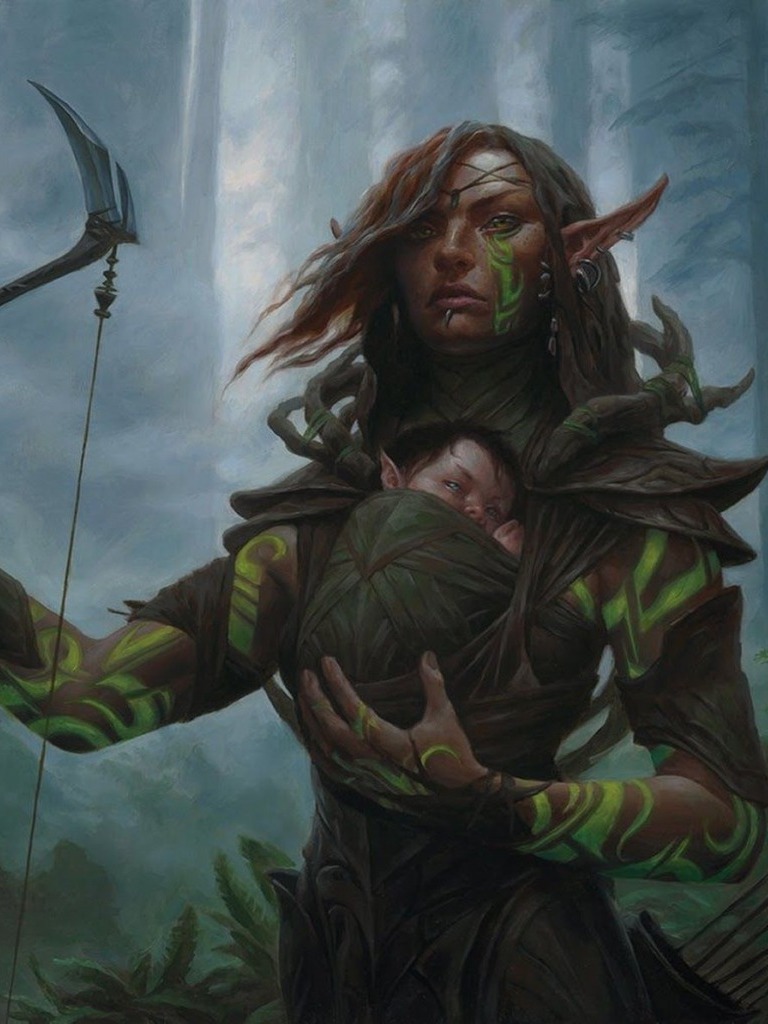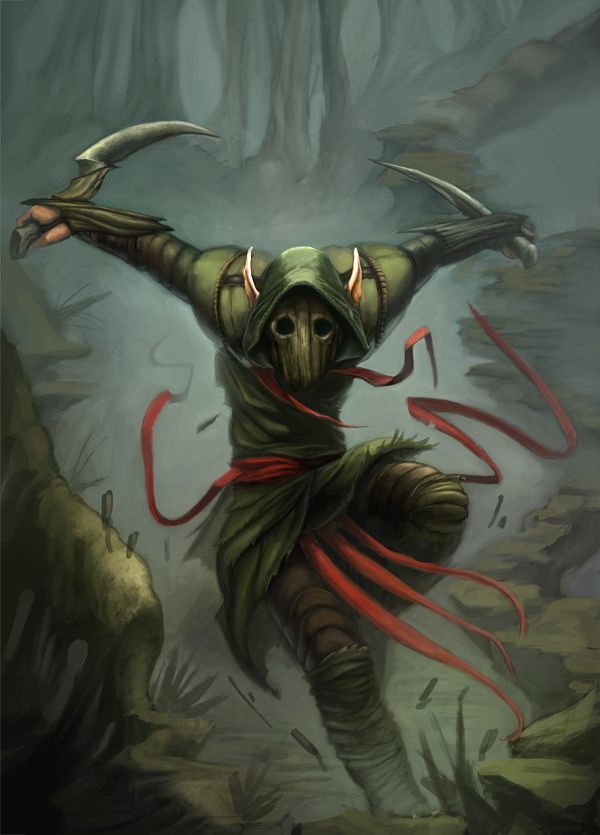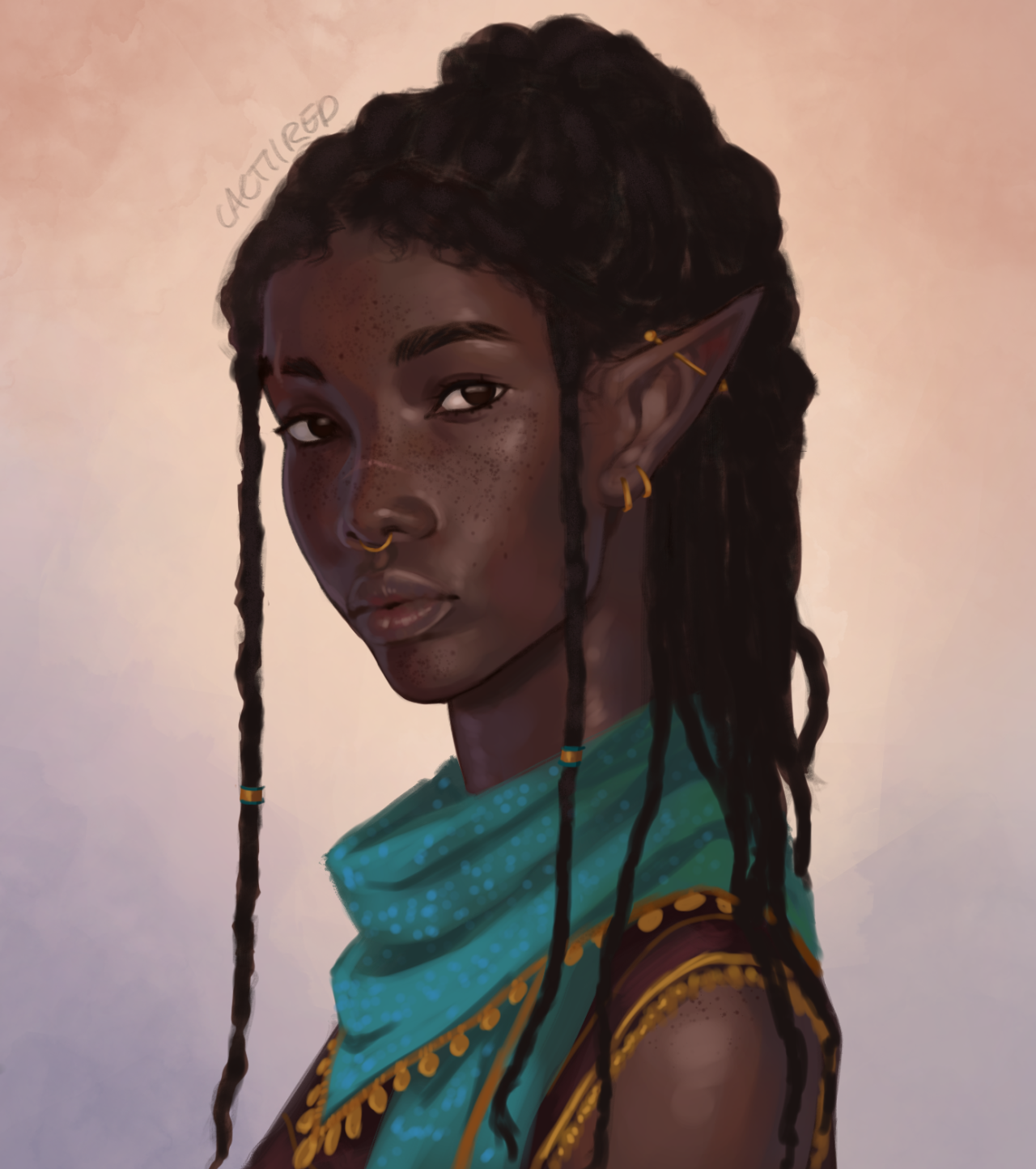Elysorri Elves
The Wild people of the Woods. The elysorri live in settlements called Cairns. A Cairn is a town or village consisting of earthen huts or dwellings built up in the trees. Sometimes, they build their huts under the large trees utilizing the giant roots to surround the hut. Each Cairn also has a nearby Grove, which is an area of the forest protected by druids and Shamans. Groves are considered holy sites and only those approved by the shaman may enter. Most of the elysorri elves in tribes. They usually marry within their tribe, but intertribal marriages can occur when two tribes wish to make an alliance. Elysorri elves earn tattoos through their life experiences. Hunters and Green Wardens gain theirs through hunts or by protecting the Cairn. Mages gain theirs as they develop their magical attunements to the Spirits and the Earth. They bear tattoos of spirals representing the spheres of magic with which they are attuned or the animals with whom they have developed a relationship. Some even have the ability to transform into their spirit animals. Hunter earn theirs through kills or feats of tracking. Their first one usually represents the elysorri’s first kill, and they earn more throughout their lives. They also often keep mementos of their kills, such as jewelry made from teeth or claws, or weapons made from bone or horn. Elysorri believe, with absolute certainty, that after death, they will return in another form to aid their people. Their life cycles never truly end. They could come back as an animal, a plant, or be born anew within the tribe. Some may return as the animal they hunted at Samhain, or as an animal companion to the Green Wardens. The mages might return as a Guardian Spirit. The possibilities are endless. The hunters and warriors of the tribes are expert marksmen and are utterly fearless. The Green Wardens are the weapons specialists and are sometimes referred to as the “Assassins of the Trees”. Stranders are always watched when they enter the elysorri woods. They are never seen unless they want to be seen. Green Wardens are granted Boons by the Goddess of the Hunt, who is usually referred to as the Huntress. Her true name has been lost to time and war, but modern elysorri call her Anne. She is the wife of the elysorri god, El’Shaun. El’Shaun is the God of the Hunt and represents the masculine fertility of nature. Anne is the goddess of animals and the fertility of the forests and jungles. She represents the female fertility of nature.
Heritage Attributes:
| Choose two | at creation | at D6 |
|---|---|---|
| Agility | Presence | Willpower |
| Strength | Itelligence | Psyche |
Heritage Skills:
| Choose three | at creation | at D6 |
|---|---|---|
| Shoot | Notice | Mysticism |
| Heal | Travel | Tame |
Heritage Skills:
- Born with Bow in Hand- Players can choose to have this talent at d8 at character creation. When the character shoots a bow, the player can add this talent to their roll for more accuracy or damage. The player can hinder to get this skill at a d4 instead and receive a plot point.
- Hunter’s Track- This talent allows the elysorri to move through wooded areas like a shadow without leaving a track behind or making a sound. The player can Hinder to use the same effect at d4 and receive a plot point. (This talent is for non-casters only.)
- Nature’s Blessing- This talent allows the elysorri to receive one of three Blessings. They can choose spirit sight, elemental embrace, or animal form. This allows the player to have the ability to see spirits, specialize in a specific element, or choose an animal transformation as a d8 Signature Asset at character creation. (This talent is for casters only.)
Basic Information:
Average height is 5’5 ft and 5’10 ft. Average weight is 135 lbs and 165 lbs. They tend to be lean and range from tone to muscular in stature, depending on their role within the Grove. Before 535 c.e., the elysorri’s expected lifespan was 360 cycles (years). Their lives are broken up into four stages, named after the seasons of the year, each consisting of 90 cycles.- Spring- During the Spring stage, an elysorri is considered a child. At the age of 90, the child goes through the Coming of Age rite, are allowed to participate in the adult part of the Beltane celebration (see Holidays), and go on a short pilgrimage in which they are expected to bring back knowledge or resources to help the tribe, after which they are considered an adult and move on to the Summer stage.
- Summer- During this time, they find their place and role within the tribe. Most young adult elysorri have many lovers, both same sex and opposite, during this time.
- Autumn- Autumn is the domestic stage, during which most elysorri choose a mate with whom to settle down. They commit to each other during Beltane and seek the tribe’s Blessing to start a family. They teach their children the ways of the Cairn.
- Winter- Finally, elysorri who reach the Winter stage are considered elders. They remain within the Grove more, protecting the Cairn and teaching the young. As the elysorri reach the end of their lifespan, many choose when they are going to move on to the spirit realm. Hunters, warriors, and Green Wardens go on a Final Hunt. Whenever possible, this happens around Samhain, the time of the Great Hunt. The elder Hunter is decorated in reds and blues, say good-bye to the Grove, and head out with an escort of younger hunters. They choose to die in battle, becoming one with Nature in their final moments. They young hunters then bring back the body, if possible, and celebrate the life of the elder with feasts and stories around the fire. Afterward, the hunter’s body is placed in a specially prepared sack with a seed clutched in its hands. The sack is buried in the woods, where a tree can grow from the remains. This process is called corning. Elderly mages and shamans say their good-byes before retreating to their huts with their apprentices. The elder passes on any final lessons they can to the apprentice while the two work together to drain all of the elder’s magical items, either releasing the magic or transferring it to new items for the apprentice. If the apprentice is ready, the title of Master to transferred to them. In the meantime, the tribe decorates the outside of the hut and leaves mementoes for the elder. After death, the apprentice and the elder’s family prepare the body and carry it out to the funeral pyre. Important items, such as the elder’s favorite robes and staff that have been drained of all magic, are placed with the body. The pyre is then lit by the tribe’s shaman and a wake is held.
A New Era
After the reemergence of the lost god, Vanya, the elysorri’s lifespan increased from 360 cycles to 2000 cycles, closer to their shilean cousins. It was revealed that in ancient times, all elves were one race. But the elysorri and the azurians broke away, each for their own reasons. Some of the elven gods supported this decision, but were locked away by the goddess that became the primary shilean deity. The Goddess punished the deserters. The elysorri lost much of their connection to magic and the World Tree, and their lifespans were shortened as a result. With [god1]’s return, they regained that lost connection. Now, the Spring and Winter stages (beginning and end of life) last two hundred cycles each, and the Summer and Autumn stages last 800 cycles each. For elysorri who were alive at the time of the Reemergence, their remaining lifespan increased, though nothing could be done about the years lost to them beforehand. Dietary needs: Elysorri can thrive in any forest or jungle. In ancient times, they learned to survive through lessons imparted directly from the spirits of the forest or jungle they lived in. These days, those lessons are passed down from parent to child, or learned from the village elders. Elysorri can thrive in environments that would kill most city dwellers (including their shilean cousins). In fact, they are so at home in the forests that other races often have rumors that the elysorri are literally “born from the trees or the beasts of the forest”. Most elysorri eat a balanced diet throughout the year that includes generous quantities of meat. Except for the mages. Those attuned to magic tend to eat a more vegetable-based diet for most of the year, ingesting higher quantities of meat during the cold winter months. In order to sustain the population, hunters go out on regular small hunts. But each year at Samhain, they perform the annual Great Hunt. In the days leading up to Samhain, a spirit appears. Sometimes it appears only to the tribe’s shaman or chief. Sometimes to a group of elders. Or sometimes in the center of the village for all to see. However it presents itself, this spirit represents the animal chosen by El’Shaun for that year’s Great Hunt. The goal of this Hunt is to kill a dire version of the chosen animal, and the Hunt is often used as a Rite of Passage for youngsters looking to join the hunters’ ranks. The meat of one dire animal is often enough to sustain the entire tribe throughout the winter months, when hunting is lean. The meat is salted and stored in specially prepared huts near the center of the village. The village’s farms, which are only larger enough for that village and are not used for trading, are also near these huts, allowing the elysorri to better protect their precious food supplies.- Perception And Sensory Capabilities:
Naming Traditions
Feminine names
Phela, Allisara, Esha, Alachia, Alysia, Amberle, Anwen, Cylia, Derail, Eldyra, Anya,
Masculine names
Arod, Barron, Barley, Tyme, Flystone, Bordynn, Green Rose,
Family names
Oak Runner, Silver Moon, Fox Chaser, Tree Whisper, Oak leaf, Myrrh thorn. Arrow Breakers
Culture
Major language groups and dialects
Druid speech, the secret language of the Elysorri taught by Druids that way the Shilen elves would not be able to understand their messages during the Risen War. Now, it is the language the casters use to cast their spells.
Elysorri common tongue is the same language the Shilen elves use. known as Selynar language. The dialect of the wood elf uses a much older one than the Shilen elves use today.
Culture and cultural heritage
Everyone learns to shoot the bow as a child, by the time they are teen they go for their first hunt. They learn to track and listen and then set up an ambush without letting the deer or prey is aware of what is happening.
If the child shows promise in the ways of magic. They still learn to shoot but are forbidden in the hunt. They must learn the ways of nature's spirits and/or the elements of nature. By the time the elf is teen the learn the history and ritual Holidays of their people. By the time they're an adult age the perform a death rite of a member of the tribe.
Shared customary codes and values
- To keep in balance with the true forces of magic, Ie nature.
- Eat meat to prevent starvation and during the dark half of the wheel.
- Kill to prevent from being killed. If one kills another elf. Out of respect cut out the heart and take one bite.
- The spirits of natures and the dead should be respected and honored at their proper days of the year.
- The holidays shall be shared and observed by all. One does not miss the holidays. No matter where the elf is.
Common Dress code
Everything they wear made from material of the woods. Either from the hide the animals the hunt or form the herbs and fibers of plants.
River stones are cut and smooth out to become jewelry of the people.
Art & Architecture
They love tattoos to express the rank and their position among the tribe. Other people tend to be impressed of the tattoos upon faces and other areas of the body of the wood elf. The tattoos tell a story of the life of that elf.
Common Customs, traditions and rituals
The Wood elves use a Barter system or service of goods instead of the common gold value of things.
They most four Important Holidays is Beltane, (1st of Fern), Samhain (26-28th of Gort)), Candlelight (1-3 of Luis), First Hunt (1st of Coil)
Lesser Holidays Mid-summer, Mid-Spring, Mid-Fall, Mid- Winter.
Common Taboos
Spitting and scratching oneself in from of the elders. Infront of Chief or Shaman is a complete disrespect and if an Elf does this, they will have to hold a hold two rocks up and down the Lions path of black mountains. up to a week with stopping for bathroom breaks and eating a bread and water.
The Green wardens
The forest sees you and will take action against you if you break the laws of the Green Wardens. The forgotten goddess of the Hunt. and goddess of the Green Wardens.
by Irina Malets
Variety of skin tones
The Elysorri can have fair tan skin tone to smooth earthly skin tones. Their skin tones do not make up their race. This is a picture of She' Allia a half elf in the Republic. Daughter of the first queen and "king".
Related Organizations




